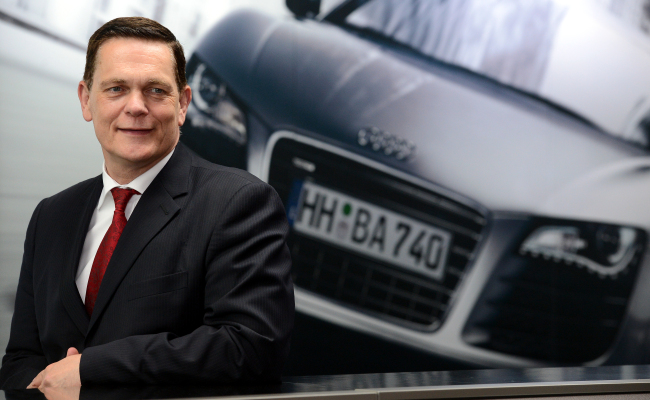Audi has seen stunning growth in Korea in recent years. Its car sales soared 46 percent to 15,126 last year. Compared to 2004 right before the establishment of its Korean branch, the figure was a 1,774 percent jump.
Johannes Thammer, managing director of Audi Volkswagen Korea, says the German luxury brand is still craving larger success here for several reasons.
“China is important but Korea is a totally different dimension,” the Korean chief of Audi said in a recent interview with The Korea Herald.
“Korean customers are more premium car-oriented than those in other markets. For our upper class cars ― the A6, A7 and A8 ― Korea is no. 5 market.”
Doing business in Korea, the home turf of Hyundai Motor and its affiliate Kia Motors, also has a symbolic meaning for the luxury brand of Volkswagen Group, he said.
 |
Johannes Thammer, managing director of Audi Volkswagen Korea, poses at the company’s headquarters in southern Seoul on Friday. (Ahn Hoon/The Korea Herald) |
“Having worked in the auto industry over the past 31 years, I’m personally astonished by the quick rise of the Hyundai and Kia brands,” he said.
“Volkswagen Group chairman Martin Winterkorn also has high respect for them, now the world’s fifth-largest carmaker. We carry out intensive tests with Hyundai and Kia cars in Germany.”
He added that he and Peter Schreyer, former design chief of Audi who now oversees car design of the Korean auto giant, are good friends.
Building a premium brand, however, is a time-consuming process, he said of the Korean duo’s aspiration to appeal with their pricier models in overseas markets.
“When I joined Audi first in the 1980s, it was not a premium brand. It took 25 years for us to achieve that we are on the same level like BMW and Mercedes,” he said.
Audi, under its corporate slogan “Progress Through Technology,” has expanded its presence relentlessly in recent years. In the all-important China market, it is the unrivaled leader in the premium segment with last year’s sales reaching 405,838 vehicles.
The Audi veteran, who has served diverse positions not just in Audi but also in other automotive companies such as BMW and Toyota, says the brand still has a way to go to become the no. 1 premium brand in some markets, including the United States and Korea.
In the nation’s surging import car market, German brands are dominant players, while Audi lags closely behind its global rivals BMW and Mercedes-Benz.
“There is nothing unexpected. They are our main competitors anywhere in the world,” he said, expressing his confidence in the intense competition.
Capitalizing on the popularity of TDI diesel engines here, Audi pins high hopes on the much-anticipated A3 compact sedan, which would replace the slow-selling hatchback version as early as at the end of this year to appeal to younger drivers.
The Korean chief, who took office in December, also recently unveiled the 4Q plan, which enhances Audi’s commitment in the four key areas ― product quality, dealership network, after-sales service and social contribution to local communities.
The new plan, among other things, would increase the number of after-sales cases that service centers handle in Korea by about 50 percent, with the figure of technicians surging from 180 to 290 within the year.
The shrewd German business man who has worked in Korea, China and Japan expressed his affection for the Korean market by describing the different characteristics of three neighboring countries in his own unique way.
“As a business man, Japan is far developed but conservative, while China is still a young man in his early 20s but powerful. Korea is 40 to 45 years old, the best age,” he said of the dynamics of the Korean market.
“Korea is the 15th largest market for Audi currently and on the way for the top 10. I have the task to develop Korean market to be bigger. I’m tending this is my last appointment in my professional life.”
By Lee Ji-yoon (
jylee@heraldcorp.com)







![[Today’s K-pop] Blackpink’s Jennie, Lisa invited to Coachella as solo acts](http://res.heraldm.com/phpwas/restmb_idxmake.php?idx=644&simg=/content/image/2024/11/21/20241121050099_0.jpg)
